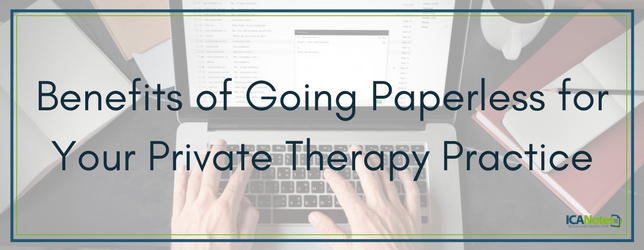The Benefits of a Paperless Therapy Practice
Is your practice still operating in the increasingly antiquated world of paper documents? If so, you aren’t alone. Behavioral health practices across the country are reporting a notably slower adoption rate of electronic health records (EHR) than medical practices. Many therapists feel embracing the digital era isn’t as vital as it is with doctors’ offices, or they feel their practice is too small to justify the time and investment such a switch would require.
However, as new features come to EHR and migration becomes easier, it becomes increasingly harder to maintain this justification. For any type of health practice, there is a tipping point where it no longer makes sense to rely on paper — and for those in private therapy, we strongly feel that tipping point has arrived.
If you’re still weighing the pros and cons of a switch to electronic health records, here are some of the best rationales for joining in on the paperless migration.
A Whole New World of Security
Paper-based records may be familiar, trusted and hard to leave behind. They’re also primed to disappear in the event of a fire or natural disaster. Something as vital as years of records shouldn’t have their fate left to chance, and moving to an EHR completely eliminates that possibility.
EHR means multiple backups of your crucial information through cloud storage, so if one server ever goes down, it’s effortless to recover from another one. All these records can also be protected by the latest in leading digital security measures, keeping them locked away from any network intrusion.
Effortless Information Sharing
EHR means all client information is accessible anytime, anywhere, by any authorized user, immediately after it’s entered. EHRs also speed up collaboration exponentially. Electronic records let you find everything client-related in one easy-to-read file, intelligently organized. Going paperless gives you an unprecedented boost to your workflow.
Increased Office Space
Do you have countless shelves of manila folders taking up valuable space in your office? By moving to a paperless system, you’ll be able to recover significant space for expansion. What could you do with extra square feet of room in your practice?
A New Era of Record Reviews
Moving to EHR brings with it a powerful means to review client data. Effortlessly review records over time, comparing assessments to progress. See a comprehensive picture of treatment without having to scan through pages of documents. Search for vital information easily and make updates with a click of the mouse. Spend more time where you’d like to focus it and considerably less on record management and review.
ICANotes Can Help You Go Paperless
Paperless systems have evolved to become an invaluable tool for behavioral health professionals, and your clinic needs to be evaluating ways to implement them. Here at ICANotes, we’ve developed a robust, full-featured EHR that caters to your specific needs, and we urge you to sign up for the free trial here. Once you’ve had hands-on experience with how this digital migration can enhance your office, we’ll be here to help you make this very smart move.
Related Posts:
Are Mental Health Record Guidelines the Same for Every State?
How Electronic Health Records Are Improving Patient Care
Biggest Challenges Facing Clinical Psychologists in 2018
How to Give Patients Access to Their Mental Health Records

